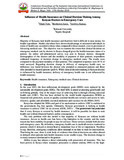| dc.contributor.author | Yulu, Elijah | |
| dc.contributor.author | Jason, Brotherton | |
| dc.contributor.author | Kamau, Geoffrey | |
| dc.date.accessioned | 2020-07-21T11:25:46Z | |
| dc.date.available | 2020-07-21T11:25:46Z | |
| dc.date.issued | 2019-10-16 | |
| dc.identifier.uri | http://10.1.130.140:8080/xmlui/handle/123456789/345 | |
| dc.description | FULL TEXT | en_US |
| dc.description.abstract | Majority of Kenyans lack health insurance and therefore find it difficult to raise money for
health expenditure. Studies elsewhere have shown disadvantage to uninsured individuals in
terms of health care accorded to them when compared to those insured, even in provision of
lifesaving medical care. The objective was to examine the extent that clinical decisions on
emergency medical care by doctors in Kenya changed given the health insurance status of a
patient. An online self-administered survey was sent to Kenyan doctors. Alongside
demographics of the doctors and the modality of payment of their patients, respondents
estimated frequency of decision change in emergency medical cases. The results were
compared to the payment modality of their patients. The completed responses were 20 % of
total surveyed. Regarding decision change in delivery of emergency health care, no
difference was found between the doctors who attended to uninsured patients and those
who attended to insured patients (p=0.4). While clinical decision making of Kenyan doctors
is influenced by health insurance, delivery of emergency health care is not influenced by
health insurance. | en_US |
| dc.description.sponsorship | 1. National Research Fund
2. Sentimental Energy Ltd | en_US |
| dc.language.iso | en | en_US |
| dc.publisher | KABARAK UNIVERSITY | en_US |
| dc.subject | Health insurance, Emergency medical care, Clinical decisions | en_US |
| dc.title | Influence of Health Insurance on Clinical Decision Making Among Kenyan Doctors in Emergency Care | en_US |
| dc.type | Article | en_US |

